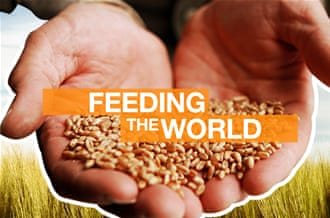Despite drought, corn growers say $5bn in controversial annual direct payments are unnecessary given US debt levels.
Chris Arsenault Last Modified: 31 Aug 2012 14:05
| |||

Critics say western farm subsidies undermine food security in the developing world [GALLO/GETTY]
| |||
| As food prices skyrocket in light of a drought in the US, and a gaping budget deficit leaves politicians on the defensive, one of America's largest agricultural lobby groups is going against the grain by calling for an end to direct farm subsidies. It's a counter-intuitive policy for a lobby group to try and limit direct cash payments to its members, but Jon Doggett, spokesman for the National Corn Growers Association, said now is not the time for the US federal government to be spending $5bn per year directly subsiding corn farmers, regardless of prices or yields. "We are really the first commodity organisation to come out and oppose direct payments," Doggett told Al Jazeera of disbursements which are made annually regardless of whether the farmer has "a good or bad year". Direct farm subsidies in the US total about $10bn annually. This does not include price supports or other aid like crop insurance which the Congressional Budget Office estimates will cost nearly $10bn per year over the next decade. "Direct payments are considered the most controversial [form of subsidy]," Timothy Wise, director of the global development and environment institute at Tufts University, told Al Jazeera. "Why are we [American tax payers] giving money away when prices are high?" Corporate welfare? Critics complain that large industrial farms receive the majority of government handouts. The top 10 per cent of farmers collected 74 per cent of all subsidies between 1995 and 2010, according to the Environmental Working Group, a research organisation, amounting to nearly $166bn. The bottom 80 per cent of recipients collected an average of $587 per year, while 62 per cent of US farmers did not receive any subsidies.
Doggett from the Corn Growers Association disputes this claim, saying subsidies benefit family farmers. "We want to make sure we have a good stable agriculture that can continue to provide the basic food stuffs or the basic components of our food supply," he said, arguing that federally subsidised insurance payments for farmers are crucial, especially during the drought. "Ninety per cent of crop production is family owned and operated. These are small businesses," he told Al Jazeera. 'National security' Internationally, agricultural subsidies from the US and European Union have been blamed for undermining farmers in the developing world. Subsidies, according to some economists, allow western farmers to sell food in foreign markets below the normal cost of production, displacing local crops which cannot compete. "Northern agricultural policy has had a tendency to depress prices and promote dumping - exports at below the cost of production - and that undermines farmers in developing countries," Wise said, adding that subsidies aren't necessarily the main factor behind western "dumping". Perhaps given the power of farm lobby groups in the US, or the role played by food as a tool for expanding geopolitical clout, US Republican presidential hopeful Mitt Romney has called farm subsidies a matter of "national security". To analysts like Carr, Romney's support for subsidies is ironic. "You can have people talking about the free market in every aspect of the government, except for farm policy," Carr said. "US farm policy has been a bi-partisan pork-barrel boondoggle. Both parties have used it to deliver federal dollars back to their states and districts." EU support The EU is a worse offender than the US, according to development organisations, because it has the highest subsidies. Consuming some 40 per cent of its total annual expenditures, the EU spends about $68bn per year to subsidise its farmers. While frequently promoting so-called free trade, the EU and to a lesser degree the US are known for blocking agricultural imports from poor countries, particularly in Africa, through tariffs.
Europe is not alone in financing strange endeavours with its farm subsidies. "Tobacco farmers are penalised and subsidised at the same time by different agencies of the US federal government," Robert McGee, professor of accounting at Fayetteville State University, told Al Jazeera. A new US farm bill, which could reduce direct payments, has been stalled by partisan bickering in Congress. The legislation itself is difficult to change partly because so many agencies are involved, according to McGee. 'Long-term decisions' The current US farm bill, which has been key legislation governing subsidies for the past five years, expires on September 30 and debates could intensify when Congress returns from its summer recess. "We need to get a bill done so growers can make long-term decisions," Doggett said. The total cost stemming from the most severe US drought since 1956 is set to be $30bn, according to estimates from agricultural economists at the University of Illinois, with private insurance companies set to pay out $18bn and the government on the hook for $14bn. Today, as commodity prices rise and analysts worry about food riots, it's unclear how the call from corn farmers to eliminate direct subsidies would affect overall food production. "Subsidies are actually hurting overall food security," Carr, from the Environmental Working Group, said. The US only has a few very large crops, he said, as subsidies distort the market and give preference to corn and other feed crops. "If we had a more diverse crop system we would be resilient against weather-related events." While critics want to see farm subsidies eliminated entirely, as other industries are not given the same government largesse, many believe the decision of the Corn Growers Association to oppose direct payments to corn farmers is a step in the right direction. But in an election year, during a severe drought, it seems unlikely politicians in Washington will heed their call. Follow Chris Arsenault on Twitter: @AJEchris |
Friday 7 September 2012
POVERTY: Corn lobby outgrows US farm subsidies
Subscribe to:
Post Comments (Atom)












No comments:
Post a Comment